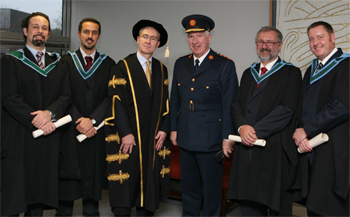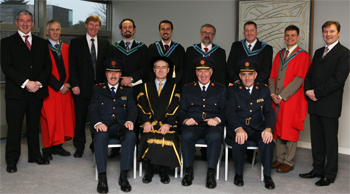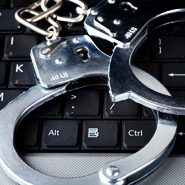Posted: 07 December 2007I
Fighting International Cybercrime
Law enforcement officers from UK, Italy, Austria and Norway, as well as two officers from Interpol are the first to graduate with master’s degrees in Forensic Computing and Cybercrime Investigation from UCD as the university turns its computing expertise to help in the international fight against cybercrime.
Garda Commissioner Fachtna Murphy, Deputy Commissioner Martin Callanan, Asst Commissioner Martin Donnellan, Det Chief Superintendent Patrick Brehony and Det Superintendent Eugene Gallagher were welcomed to University College Dublin by President Dr Hugh Brady on 6 December 2007, to attend the conferring of the first six graduates of the MSc in Forensic Computing and Cybercrime Investigation.
The UCD Centre for Cybercrime Investigation, part of UCD School of Computer Science and Informatics, launched this unique programme in January 2006, targeted at law enforcement officers. The initial intake included officers from the UK, Italy, Austria and Norway, as well as two officers from Interpol.

The first graduates of the University College Dublin Centre for Cybercrime Investigation MSc in Forensic Computing and Cybercrime Investigation at their conferring ceremony (6th December 2007) pictured were Giorgio Ruggieri (Arma dei Carabinieri, Italy), Giuseppe Di Leva (Polizia di Stato, Italy), UCD President, Dr Hugh Brady, Garda Commissioner Fachtna Murphy, Bernhard Otupal and Werner Schuller (both Austrian Federal Police – The Bundeskriminalamt, currently on secondment to the International Criminal Police Organisation, INTERPOL in Lyon).
In 2007 the intake expanded to 20 with officers from Ireland, the UK, the Netherlands, France, Germany, Greece, UAE and Hong Kong.
The purpose of the master’s degree is to produce graduates with skills enhancing their ability to investigate cybercrime and to train junior colleagues in forensic computing and cybercrime investigation. It educates officers in forensic examination and analysis of digital media for the retrieval of computer-based evidence. The programme covers the latest techniques relating to password breaking, encryption and steganography (hiding messages within images) which will allow them to deal with the ever-increasing threat of cybercrime.

Pictured Back Row (l - r): Det Supt Eugene Gallagher, Garda Bureau of Fraud Investigation (GBFI), Dr Joe Carthy, Head of School, Computer Science and Informatics, Det Chief Supt Pat Brehony, GBFI, Giorgio Ruggieri, Arma dei Carabinieri, Guiseppe Di Ieva, Polizia di Stato, Bernhard Otupal, Interpol, Werner Schuller, Interpol, Dr Pavel Gladyshev, School of Computer Science and Informatics, Det Insp Paul Gillen, GBFI,.
Front Row (l - r): Deputy Commissioner Martin Callinan, The President, Garda Commissioner Fachtna Murphy, Assistant Commissioner Martin Donnellan.
The programme would not be possible without the collaboration of the Garda Bureau of Fraud Investigation and the Computer Crime Unit. UCD has worked with An Garda Siochana for ten years to develop forensic computing and cybercrime training programmes. This new programme is a natural development from this collaboration and members of the Garda Bureau of Fraud Investigation continue to provide valuable input to programme content and delivery.
It is also important to recognise the important role that An Garda Siochana has played in EU cybercrime training. Despite being one of the smaller police forces in the EU, they have already led two pivotal training projects and have established a first class international reputation.
As a result of UCD's modularisation programme, these programmes are accredited by UCD and allow participants the opportunity to use them to contribute toward academic qualifications from UCD.
Joe Carthy, Head of UCD School of Computer Science and Informatics said: “These activities have earned support and respect for UCD from international police forces, Interpol, Europol and researchers in the field of digital forensics and IS security. It has placed UCD in a unique position to provide training in this area internationally. We look forward to continuing our successful research and training collaboration with An Garda Siochana in making a real contribution to tackling the international problems and threats posed by cybercrime.”
Detective Inspector Paul Gillen, Head of the Garda Bureau of Fraud Investigation said: ”Today is a great achievement for the partnership between law enforcement and academia and it is a particular success for UCD and An Garda Siochana. This development has over the years been sponsored by the EU Commission and the Irish Dept of Justice, Equality and Law Reform and the UK National Police Improvement Agency. In addition, the programme has been assisted by volunteer law enforcement officers from all EU countries as well as UCD, Interpol and Europol.
UCD has developed a partnership with Interpol and Europol and is currently co-chairing the European initiative for the development and review of cybercrime investigation training with An Garda Siochana and the UK's National Police Improvement Agency. This initiative continues to strive to develop a broad spectrum of academic qualifications for law enforcement officers globally to help them in the fight against cybercrime. We are very happy with the partnership and see it as a stepping stone to greater initiatives in the future.”

